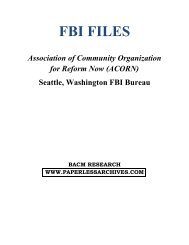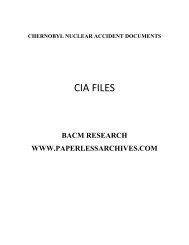national security agency journal articles world war ii german ...
national security agency journal articles world war ii german ...
national security agency journal articles world war ii german ...
You also want an ePaper? Increase the reach of your titles
YUMPU automatically turns print PDFs into web optimized ePapers that Google loves.
UNCLASSIFIED<br />
CRYPTOLOGIC QUARTERLY<br />
headquarters of Generals Bradley and Dwight Eisenhower in the Hotel Alfa. After the<br />
Battle of the Bulge in December 1944, we went through parts of Belgium, entered<br />
Germany at Aachen, and after four months of movement, ended the <strong>war</strong> in Forchheim,<br />
north of Nuremberg.<br />
As noted previously, all the operational work was performed by enlisted men. Many of<br />
the officers were sent by the Signal Corps to supervise subsidiary functions, such as<br />
transport and billeting, and had little knowledge of our work. Occasionally, men from the<br />
intercept units drifted in and out of the central groups, seemingly to absorb some notion of<br />
what was being done. Of course we had our own intelligence officers, and two in particular<br />
deserve special note for their hands-on attitude and productive work.<br />
The officer supervising my cipher-breaking section was the very erudite Captain<br />
Benjamin Sch<strong>war</strong>tz. He was a family man, over forty-five, who had volunteered to<br />
contribute his expertise to the <strong>war</strong> effort. Sch<strong>war</strong>tz was skilled in Sanskrit, other ancient<br />
Indic languages, and several modern tongues, and he had headed departments for those<br />
exotic languages in the New York Public Library and the Library of Congress. He<br />
instructed us in cryptanalysis, watched over our daily efforts, and assumed a rather<br />
paternal role to<strong>war</strong>d his men. He was a person who cared, and that meant a great deal.<br />
Captain Ho<strong>war</strong>d Mendel supervised the traffic analysis team. He worked at it<br />
incessantly, and he was an intelligent and effective participant throughout. He was<br />
wounded in Luxembourg when a stray airplane bullet went through his side, but much to<br />
the reliefofhis men, their Howie soon recovered and came back.<br />
Soon after we landed, an unexpected development struck our cipher-breaking section.<br />
Many of the approximately sixteen cryptanalysts - no matter how adept they had been in<br />
training classes - seemed unable to cope with a real-life situation in which a solution<br />
might not exist. A substantial portion of the enemy traffic could not be solved, and this<br />
uncertainty created a psychological barrier that stopped men before they started. As a<br />
consequence, many faltered and produced few results.<br />
Four of our men did most of our breaking. They were George Hussey of Bronxville,<br />
New York, and Eric Porter of EI Segundo, California, who worked marvelously together,<br />
Ho<strong>war</strong>d Arnold, and this writer.<br />
Though we were the signal intelligence arm of the Twelfth Army Group, S.S.D.D.<br />
traveled by itself in the field. We were an isolated outfit, known only to the intelligence<br />
people. Our <strong>security</strong> and secrecy were superb, even within the outfit. People in one section<br />
knew very little about the doings in other sections. On a few occasions, senior officers from<br />
headquarters stopped by to express appreciation for our results, and they would mention a<br />
specific case or two that were outstanding.<br />
Our daily intelligence production was notable from the start, but it reached a<br />
crescendo during the three months in Luxembourg. Our deciphered intercepts, traffic<br />
analysis, and direction finding indicated unusual enemy activity before the Battle of the<br />
Bulge began on 16 December 1944. tjudge that people at army group headquarters simply<br />
UNCLASSIFIED 34
















